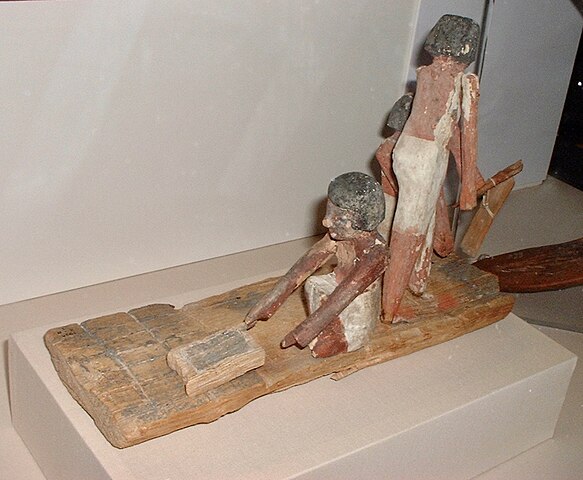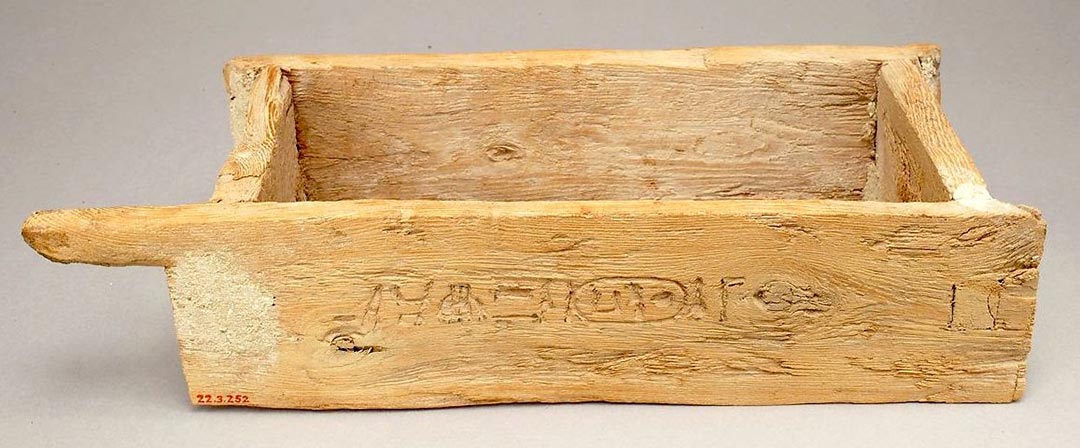
Ancient Egyptian painted wooden model of three men making bricks, 12th Dynasty, 1991–1778 BCE, Beni Hasan tomb 275, British Museum
https://en.wikipedia.org/wiki/Bricks_wi … M1.agr.jpg
While they were slaves, one thing they did was make bricks with straw (mudbricks).
Exod 1:14
And they made their lives bitter with hard bondage, in mortar, and in brick, and in all manner of service in the field: all their service, wherein they made them serve, [was] with rigor.
Exod 5:7 Ye shall no more give the people straw to make brick, as heretofore: let them go and gather straw for themselves.
Brick making was commonly a task for slaves.
“Brick making appears to have been a labor specialization that was normative for slaves in ancient Egypt.”
https://www.thetorah.com/article/what-k … o-in-egypt
Straw was an essential element in making bricks in Egypt.
Many clay products require the addition of other materials to add strength and durability. In the case of bricks in Old Testament Egypt – river clay is usually composed of very fine particles and so would dry slowly – adding straw would “open up” the clay, allowing it to dry more readily in the sun. In addition to aiding in drying, the linear nature of straw adds stability to the clay brick in much the same way that rebar or wire mesh reinforce modern day concrete. Bricks made without straw would break and crumble easily. Adobe bricks used around the world are generally only sun dried but grasses, straw and other materials are added to the clay for the same basic reasons.
https://en.wikipedia.org/wiki/Bricks_without_straw
Mudbricks were made from Nile alluvium, a conglomerate of clay and sand. The proportion of clay within that alluvium determines much of the properties of the mud. When the content of clay is proportionally high, bricks can be made without the use of straw. When the content of clay is low, as is more typical, straw was added to prevent a brick from falling apart as it dried.
https://www.baslibrary.org/biblical-arc … iew/46/2/6
Straw was collected after harvest time and stored in order to be used throughout the year.
Collecting the straw for the bricks is especially hard work. The straw is usually taken from the fields after the wheat has been harvested and crushed by the farmers. In ancient times, the Egyptians left the stems of the wheat in the fields. This minimized the labor needed for mudbrick production.
In Egypt (as well as the Levant), straw was available only after harvest time. This might create a serious hindrance in the construction process, as the bricks could be produced only during the dry season. Since construction with bricks was a year-round activity, chaff was collected and stored to ensure a continuous supply.
https://www.patheos.com/blogs/davearmst … ology.html
So, straw was a commodity that most often provided by the Pharaoh and not something easily acquired year round. This problem is alluded to in Ex 5:11.
Exod 5:10-11
10 And the taskmasters of the people went out, and their officers, and they spoke to the people, saying, Thus saith Pharaoh, I will not give you straw.
11 Go ye, get you straw where ye can find it: yet not aught of your work shall be diminished.

https://www.thetorah.com/article/what-k … o-in-egypt
Levantine Asiatics making bricks (Illustration from N. D. G. Davies, Paintings from the Tomb of Rekh-Mi-Rē
https://www.thetorah.com/article/what-k … o-in-egypt
Picture of a brick mold found at Lahun:

https://patternsofevidence.com/2021/02/ … mudbricks/
The word “adobe” can be traced back to Egyptian mudbricks:
The modern word adobe traces its origin through Spanish, Arabic and back to the ancient Egyptian word for mudbrick, djebet. For the straw that Pharaoh denies to the Israelites, the Biblical text uses the word teben, but the word actually means, somewhat more broadly, “chaff.”
https://www.academia.edu/38207809/With_ … ade_Bricks
The idiom, make bricks without straw, originated with this Biblical story, which means “to do or attempt to do something without the basic necessary tools or materials one needs.”
https://debatingchristianity.com/forum/viewtopic.php?p=1073207#p1073207
